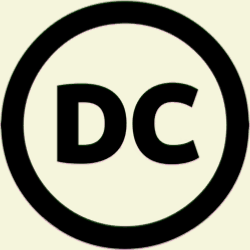Projects
Decentralized Commons initiative includes two projects: DC BY 0.1 and Authors Link Equity Regeneration Campaign
DC BY 0.1 is a fork of Creative Commons BY license with modifications ensure that creators receive the majority of value from link equity created by attribution links.
Authors Link Equity Regeneration Campaign is an action plan focused on healing the damage done to the commons by the exploitative rent-seeking behavior of megacorps.
DC BY 0.1
DC BY is a fork of Creative Commons CC BY license that redirects link equity captured by the platforms to the original creators while preserving free culture protections for the public.
The project is archived and is NOT under active development.
Motivation
A core tenet of Creative Commons licenses is attribution requirement. Terms of CC 4.0 licenses specifically include this clause: "...to the extent practicable, URI or link to the material if supplied".
In an online context, the most valuable component of HTML links is link equity. Link equity is an abstraction that describes an influence of the given link on the rankings of search engine results page (SERP). In general, increase in link equity means higher positions in SERP and more traffic from search engines to the link targets URLs.
When web was young and brimming with independent and hobbyist projects, links were the currency of the internet. Several hundred high quality links from authoritative domains generated as much value as a professionally done advertising campaign.
As web evolved, network effects and misalignment of incentives, among other reasons, prevented authors from being practically able to host their own content. As as a result, when platforms offered an option to apply a CC license to an uploads and most uploaders did not have a personal website, CC attribution linked to the authors' page on platform's website. As a result most value from the attribution was captured by platforms, stripping creators of billions of value in organic search engine marketing. The largest offenders are Youtube and Flickr, that at some point were owned and operated by the largest search engines in the world. This wasn't a mistake or a oversight. Hanlon's Razor doesn't apply.
There are at least 1.4 billion CC-licensed works at least 35% of them are hosted on Flickr, Youtube, DeviantArt where attributions link to the hosting platform, not an artist.
There at least 500 million works where link equity was stripped from the original creator. DC BY goal is to change that.
Comparison of relevant CC BY and DC BY clauses
This license lets others distribute, remix, tweak, and build upon your work, even commercially, as long as they credit you for the original creation.
This license lets others distribute, remix, tweak, and build upon your work, even commercially, as long as they credit you for the original creation and to an extent practicable, value generated by the attribution is passed to you, the author.
Attribution
You must give appropriate credit, provide a link to the license, and indicate if changes were made. You may do so in any reasonable manner, but not in any way that suggests the licensor endorses you or your use.
Attribution
You must give appropriate credit, provide a link to the license, provide a link to an URI under direct author control and indicate if changes were made. You may do so in any reasonable manner, but not in any way that suggests the licensor endorses you or your use.
URI requirements
To the extent practicable, URI or link to the material if supplied.
URI requirements
To the extent practicable, URI or link to the material entry on the distributed commons registry.
Platform requirements
N/A
Platform requirements
Any website that hosts DC licensed content is explicitly forbidden to provide attribution linking to any URI that is not under direct author control.
Further description of possible attribution requirements can be found on this page.
Public benefit
DC BY license does not remove or restrict any freedoms for public granted by the Creative Commons license. You are free to:
- Share — copy and redistribute the material in any medium or format
- Adapt — remix, transform, and build upon the material
Value flows
CC BY
DC BY
Registry
Items in this list are design goals. Exploration of possible design can be found here.
Decentralized
Prevents a single point of failure. Based on a public blockchain. Individual registry entries are controlled by their creators and private keys.
Permanent URIs
URIs are preserved, link rot is prevented.
Canonical URIs
Link equity is under direct control of a creator and can always be redirected from the registry URI to a creator's URI using the rel="canonical" tag attribute.
Pseudonymous
Provides a straightforward path for creators who prefer to publish their works under a pseudonym but would like an option to merge their identities in the future.
Open data
Registry APIs provide unlimited open access to registry data and offer great developer experience.
Governance
Subject to further research and analysis.
FAQ
The best outcome would probably result in merger of the DC BY license into the Creative Commons mainline under the stewardship of Creative Commons foundation.
At this moment, you shouldn't use any DC license for any of your works. DC BY is under active development and wasn't validated.
When the license terms will be finalized, you would want to use DC BY license if you can imagine a way to obtain economical or non-economical value from the increased number of visitors to your website.
Decentralized registry is a smart contract built on a public blockchain or an instance of public blockchain where pages hosting the content are controlled only by the private keys of the author.
Design of a decentralized registry and public blockchain choice is subject to research, prototyping and testing.
- A suite of smart contracts or a blockchain
- Web app for creators and public
- Browser extensions
- Mobile apps
The goal of a DC registry is to provide a reliable support net for creators, not become a maintenance liability.
